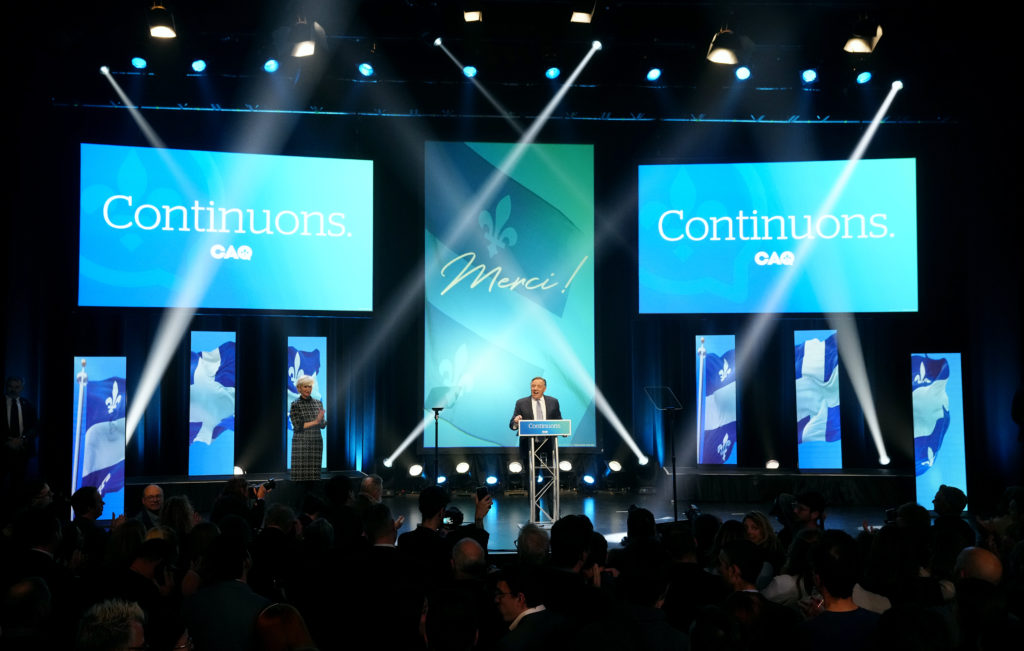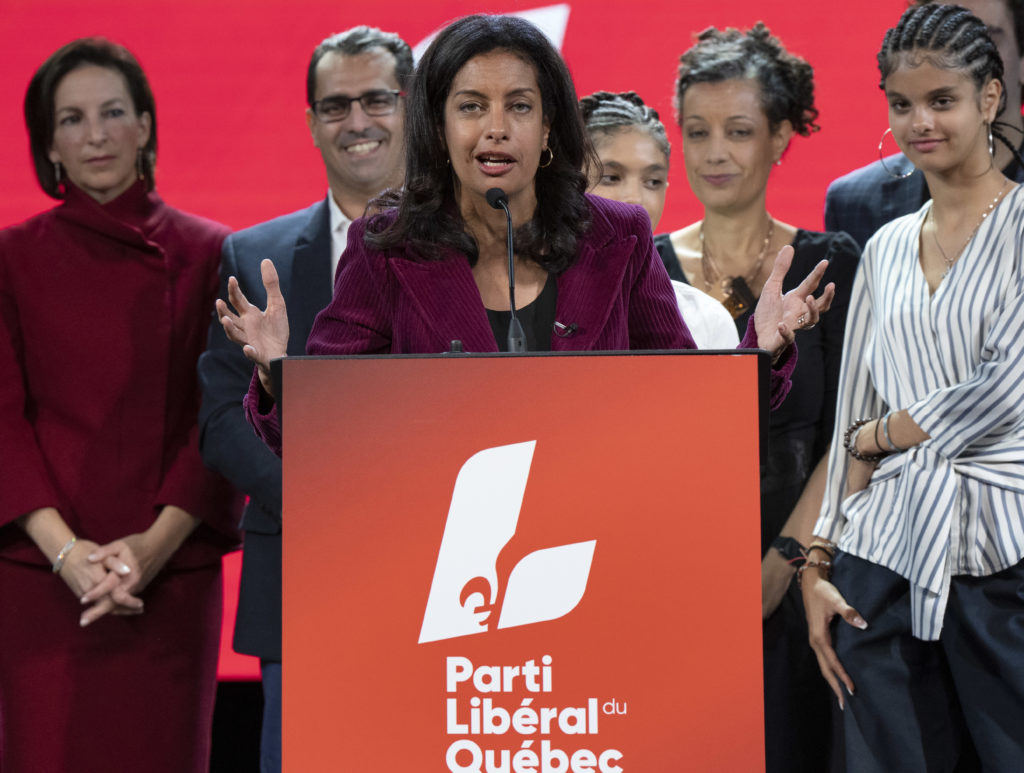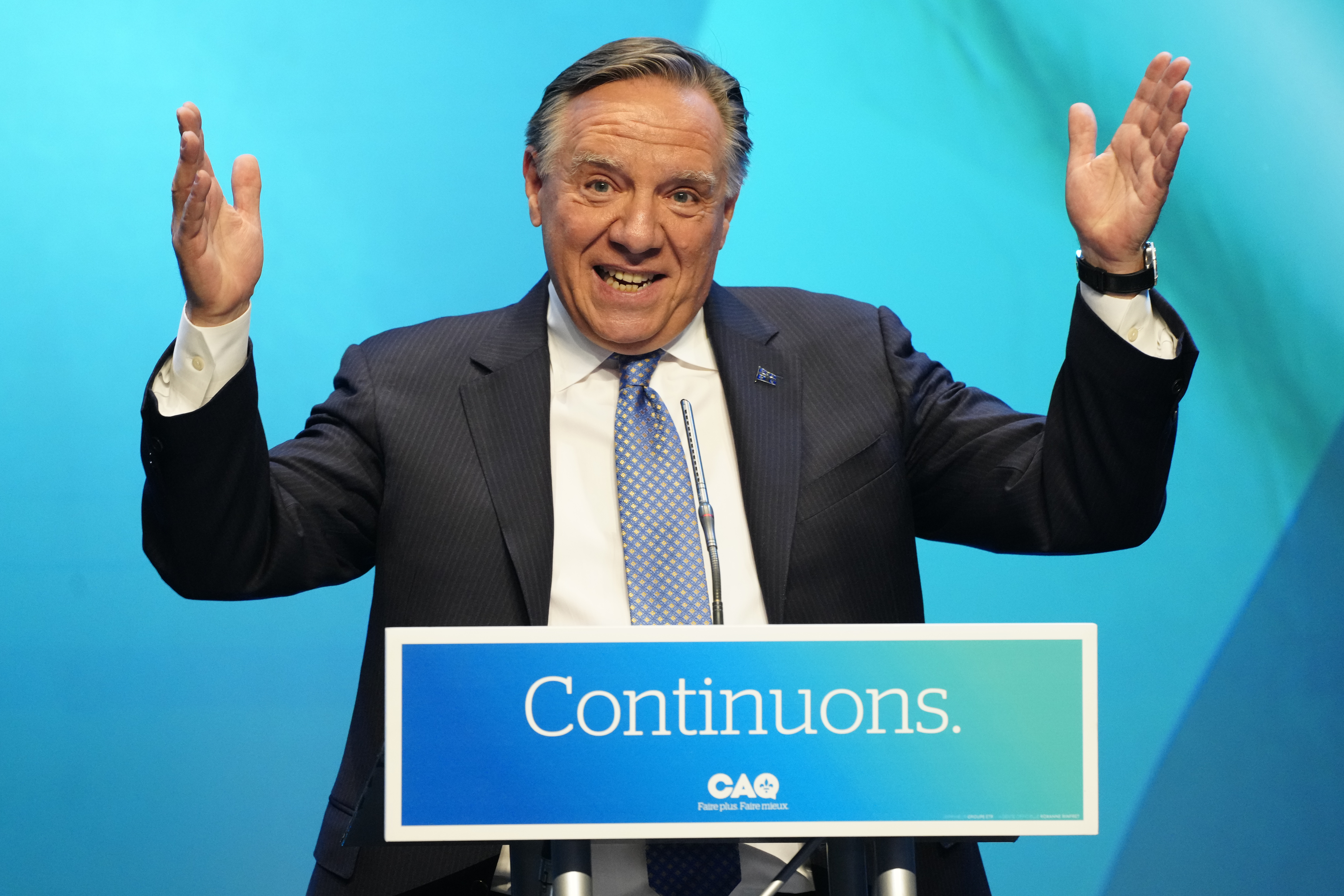For the first time in any Québec election, five competitive parties were represented in most ridings. Multiple splits led Coalition Avenir Québec Party and François Legault to a strong victory with a second majority mandate in Québec’s general election on Monday. The largest number of women elected, and Quebec’s first indigenous woman elected to the National Assembly were milestones for the province.
The CAQ won 41 per cent of popular vote and picked up 15 seats in multiple regions outside of the Montreal Island including Laval. The four other parties were almost head-to-head in multiple polls.

Legault addressed Quebeckers Monday evening following his victory, reiterating that he will be a Premier for all Quebeckers, and outlining his priorities for the next four years:
- Education: Supporting teachers and students; investing in schools and recreational infrastructure.
- Economy: putting more money in the pockets of Quebeckers by tackling affordability and inflation; creating wealth while reducing GHG emissions; supporting indigenous participation in the economy and reconciliation.
- Health: implementing first-line healthcare that’s human, efficient, and accessible.
- Climate Change: making Quebec a leader in the green economy.
- National Identity: putting Quebec First and protecting the French language while supporting the integration of newcomers.
A new opposition in Québec
The Liberal Party (PLQ) will maintain its status as official opposition, with Québec Solidaire (QS) as second opposition party. The Parti Québécois (PQ) lost its official party status but will stay in the National Assembly. The Parti Conservateur du Québec (PCQ) did not win any seats.
Liberal leader Dominique Anglade was re-elected in her riding of Saint-Henri–Sainte-Anne. Addressing her voters Monday night, Anglade promised to be a “voice to all Quebeckers” – a nod to her position on divisive campaign issues such as Bill 96.

The PLQ witnessed its lowest percentage of vote in recent history. The West Island remained the only stronghold for the party, with one seat in Aylmer sector of Gatineau – all primarily anglophone ridings. The next leadership review will be in 2023.
QS kept seats in the eastern part of Montréal, winning seats in some historic liberal strongholds such as Greater Montreal. Gabriel Nadeau-Dubois et Manon Massé re-elected in their respective ridings.
The PQ failed to win any seats in Saguenay Lac St-Jean for the first time in 50 years but elected their leader, Paul St-Pierre Plamondon, in his first election as an MNA.
PCQ finished second behind in multiple ridings of the Québec City region but won no seats. Duhaime was unable to win his riding but vowed to return in 2026.
Polling
The CAQ maintained a strong lead throughout the entirety of the 36-day campaign and secured their majority win with 41% of the vote, securing 71% of the seats. The other four parties were almost head-to-head in the various polls between 14-16%, prompting a call for electoral reform from all opposition leaders. Voter turnout was slightly higher than 2018, with 67.3 % of eligible Quebeckers heading to the polls, and the highest proportion of early voters ever recorded (24%).
- The CAQ won 90 seats, up 16 from 2018
- The LPQ won 21 seats, down 10 from 2018
- The QS won 11 seats, up 1 from 2018
- The PQ won 3 seats, down 7 from 2018
Key players
With a strong mandate after last night’s election, Premier Legault is expected to announce some changes to the cabinet in the coming weeks, ahead of the start of the fall session at the National Assembly. A number of cabinet ministers are likely to remain in their current portfolios in order to continue to work begun in the previous legislative session. While only speculation for now, five high-profile cabinet ministers could stay in their current roles:
- Minister of Health and Social Services Christian Dubé.
- Minister of Finance Eric Girard.
- Deputy Premier and Minister of Public Security Geneviève Guilbault.
- Minister of Economy and Innovation, Pierre Fitzgibbon.
- Minister Responsible for Government Administration and Chair of the Treasury Board Sonia LeBel.
Minister of Immigration Jean Boulet might be moved to another portfolio following controversial comments made during the campaign.
Implications for key sectors
Environment and green energy
Environment was at the heart of the 2022 election. Throughout the campaign candidates and parties emphasized that Quebec is a leader in the green economy and must take steps to consolidate this role at a domestic and international level. The CAQ’s environmental commitments were inspired by the 2030 Plan for a Green Economy, which they presented as a ‘road map’ to achieving their emissions reduction targets in early 2022. Electoral commitments included:
- 37.5 per cent reduction in GHGs from 1990 levels by 2030.
- Achieve carbon neutrality by 2050 through transportation electrification, industrial GHG emission reductions, green hydrogen and bioenergy.
- Create a Blue Fund of $650 million over five years to protect water.
- Protect 30 per cent of Quebec’s territory by 2030.
Legault has touted Quebec’s abundant supply in hydroelectricity as key to achieving 2030 and 2050 decarbonization targets. The CAQ platform included commitments to building infrastructure to respond to the province’s need for clean electricity, through investments in new renewable energy projects such as wind, solar, geothermal and hydroelectricity, as well as emerging alternatives to fossil fuels like hydrogen, and biofuels. Energy storage will also be vital to electrification, necessitating the development of a circular critical minerals and battery supply chain to make Quebec the “green battery” of North America.
The CAQ government will continue efforts to harness Quebec’s clean energy and natural resources for economic development purposes. Legault and Fitzgibbon’s approach to innovation policy has increasingly merged economic development interests with environment and natural resources. The Quebec Research and Innovation Investment Strategy, the Plan for the Development of Critical and Strategic Minerals and the Battery Industry Development Strategy, along with the Innovation Zones, are examples of policies put forward by the CAQ to attract investment and stimulate economic growth.
That being said, it has been widely acknowledged that Quebec must integrate and develop alternative energies to meet the province’s electrification goals. According to Hydro-Quebec’s 2022-2026 strategic plan, 100 terawatt hours (TWh) of energy are needed to achieve carbon neutrality by 2050. Meeting domestic demand while continuing efforts to expand Quebec’s energy exports will be a key issue.
Innovation and life sciences
Through the Québec Research and Innovation Investment Strategy and the Québec Life Sciences Strategy, the CAQ government has been working to attract foreign investments in the province. Especially with the investment in innovation, the CAQ is looking to half the labour productivity gap with Ontario by 2027, investing $7.5 billion over the next five years. With the Life Sciences Strategy, Legault aims to stimulate private investment in biosciences, developing new industrial sectors and increase the presence of Québec companies in international supply chains.
Healthcare system reform
The CAQ announced a series of measures for the Quebec health care system, with Legault backtracking on his 2018 election promise that every Quebecer would have a family doctor. Minister of Health, Christian Dubé, admitted on the campaign trail that not all Quebecers will not have a family doctor, he cannot promise something that is “not possible”. The CAQ platform have looked for both public and private health care solutions to address these long overdue issues:
- Launch a digital health platform, Votre Santé, to serve as entry point and direct people to the right health care professional
- Establish a new health care agency, Santé Québec, which “will have the mandate to co-ordinate the operations of the health system while the Ministry of Health and Social Services will focus on its role of planning, orientation, measuring the system’s performance and budgeting”
- CAQ proposes to build 2 private medical centres in Quebec and Montreal to ease strain on the public health care system (30-40 per cent reduction)
- CAQ looks to deploy home hospitalizations (hôpital à la maison), transferring patients from hospitals to their homes to continue care, followed by a team of doctors and pharmacists
- With a $400 million investment, the CAQ plans to hire 660 doctors and 5000 health professionals. There are 11,000 positions unfilled in the public health-care network, but the CAQ says it will hire 27,000 people over the next four years to address retirements and departures
When asked about funding for private sector solutions, Legault stated that “If we want to change the health network, we have to change the recipe, innovate and review the place of the private sector.” He further reassured Quebecers that they would not foot the bill directly when accessing these services, leaving it to the government to cover the costs. “For us, the private sector must be free for the patient […] but it is certain that in the end, it is the government that will pay.”
Immigration and labour shortage
Throughout the campaign, the CAQ looked to education and immigration to address the supply of labour. Labour shortages have been notably felt in life sciences, health care, the service sector, engineering and trades. Despite these concerns, Legault has been clear that immigration needs to be limited to protect the French Language.
Commitments relation to immigration included:
- Reduce the number of immigrants from 70,000 to 50,000 per year starting next year
- Invest $290 million in supporting the employment integration of newcomers
- Invest $348 million in vocational training
Infrastructure and transport
To support Quebec’s green transition, the CAQ has promised to make investments in key infrastructure projects related to the electrification of transport. Campaign commitments included the expansion of charging infrastructure for personal and public electric transportation.
The CAQ has been focusing on its support in the capital region, in an effort to keep its 2018 election promise of building the “third link” tunnel to connect Québec City and Lévis. The project is currently estimated to cost $6.5 billion, with the promise of partially funding an electrical tramway project. Legault was criticized throughout the election for failing to make public studies on the construction of the project.
Investments in the infrastructure of tomorrow, such as digitization, artificial intelligence and telecommunications will be equally important, both to modernize Quebec’s economy and support essential sectors such as healthcare, energy, and education.
Bill 96
The controversial Bill 96, adopted in May 2022, reinforced the Charter of the French Language. Justified with the strong desire in protecting the Quebec culture and identity, the CAQ supported by QS gave themselves the challenge of reconciling these objectives with the desire to attract more foreign investment to the province. The bill has been criticized as potential implications for businesses, with several companies sharing their concerns over the adoption of language Bill 96, requesting delay in its implementation, as they face a labour shortage. The CAQ government explained that the bill will not be applied for another year, providing time for companies to adjust. Some key points:
- Businesses with 25 or more employees must ensure that French is the common language in the workplace.
- Refugees and immigrants to Quebec will now receive services exclusively in French after their first six months in the province, unless that provision conflicts with “health, public safety and the principles of natural justice.”
What’s next?
Over the coming days, Premier Legault will meet with opposition leaders to discuss priorities for the months ahead. It is expected that Legault will unveil his cabinet in the next two weeks.
Quebec’s legislature will return on November 15, 2022, for its 43rd session. Parties will have to determine Quebec’s path forward on key issues of Economy, Healthcare, Climate Change, Education and National Identity.
